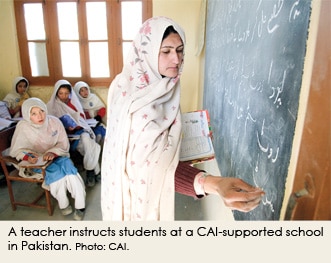The immediate benefit and long-term impact of educating a girl is astonishing. Health improves. Economies grow. Societies are transformed. When girls are educated, their families, communities, and nations prosper. Educated girls are changing the world. Here’s why:
1. An educated girl can increase her income. A girl with an extra year of education can earn 20% more income as an adult (The World Bank, 2011). More income means better nutrition and healthcare for her family. Living conditions improve. Income can be the impetus to get out from under the grinding cycle of poverty into a life with choices and opportunities.
2. She marries later. An educated girl breaks the cultural pattern of girls marrying as children. Girls with higher levels of education are also less likely to have children at an early age (UNESCO, 2013). Marrying later means she won’t be a child herself when she becomes a mother.
3. An educated mother has fewer children. She has better knowledge about contraception as well as increased opportunities for employment. An educated mother provides better care of her children at home, thus increasing the value of her children’s human capital and reducing the need for more children (IZA World of Labor, 2016).
4. Educated mothers are less likely to die in childbirth. Educated women’s knowledge about health care contributes to reduced maternal mortality rates during pregnancy, childbirth, and the postpartum period. Increased education of girls also leads to more female health care providers to assist with prenatal medical care, labor and delivery, and follow-up care. Skilled care before, during, and after childbirth can save the lives of women and newborns (WHO, 2019).
5. Her children are healthier. The single biggest factor in reducing the mortality rate among children under five is more education for women (as reported in Scientific American, 2011). A literate mother has a 50% higher chance of her child surviving past the age of five (UNESCO, 2011). More education helps women make better decisions about prenatal care, basic hygiene, nutrition, and immunization, all of which contribute to healthier children.

6. Children of an educated mother are less likely to be malnourished. Malnutrition accounts for 45% of all deaths among children under five worldwide (Lancet Report, 2013). An educated mother is more likely to feed her children healthy food, to know the signs of malnourishment, and to take action if she suspects a problem. Adequate nutrition in the young child contributes to normal brain and physical development and overall better health and well-being.
7. She invests in future generations and her community. An educated woman invests nearly all (90%) of her income into her family and community (Phil Borges, Women Empowered: Inspiring Change in the Emerging World, 2007). Her knowledge influences how she raises her children and impacts her role in the family and the community. An educated mother is more than twice as likely to send her children to school (UNICEF, 2010) thus continuing the cycle of education and establishing a precedent for the generations that follow.
8. She experiences less discrimination. Girls and young women who are educated have a greater awareness of their rights (Education First: An Initiative of the United Nations Secretary General, 2012). They are more likely to stand up for themselves in male-dominated cultures and to advocate for themselves and their children.
9. She makes her own decisions. Educated girls and women have greater confidence and freedom to make decisions that affect their lives (Education First: An Initiative of the United Nations Secretary General, 2012). They’re better equipped to challenge the cultural imperative that women belong in the home, raising children and doing the chores. Education empowers young women to think beyond the cultural norms and pursue their dreams of a better life.
10. She’s safer. Education protects women from abuse (Atlantic Monthly, May 15, 2014). Extremists hate smart girls because smart girls are less likely to be kept down. Girls’ schooling has a protective effect against domestic violence, rape, and child marriage. Each additional year of schooling is associated with a 1% increase in a female’s ability to refuse sex with her partner. Women with some or completed secondary education have an 11 and 36% lower risk of violence, respectively, compared with women with no education (World Bank report, 2014). Educated women are more likely to work outside the home, avoid isolation, and earn income, all of which lessen their vulnerability to domestic and physical abuse.
Incredible things happen when a girl gets the education she needs. Her life and the lives of her children improve. She earns an income and contributes to the local economy. She models confidence and self-determination for her children and the girls and women in her community. Thanks to the support of donors like you, we can continue to empower girls and women in Central Asia, where education is changing the world, one girl at a time.
KEEP UP WITH THE LATEST NEWS
Sign up to receive updates and stories from the field.
Privacy Statement | Copyright 2025 Central Asia Institute. All rights reserved. Site Map
CAI is a U.S.-registered nonprofit 501(c)(3) organization, EIN #51-0376237. Contributions may be tax-deductible in the U.S.